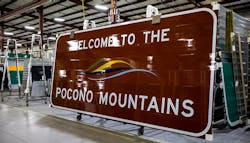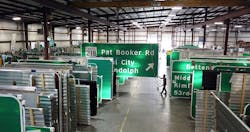Interstate SignWays, founded in 1959 in Little Rock, AR, focuses on manufacturing high-quality, specialized highway, wayfinding, and airport signage. In fact, they’re one of the largest highway sign manufacturers in the United States.
To stay ahead in this competitive market, they need to be able to quickly and efficiently produce signs that meet rigorous specifications — and they need to be able to produce them on demand. This can be difficult to accomplish with traditional screen printing, where the amount of time it takes to set up a print job can make it cost-prohibitive to print signs on demand or in smaller quantities.
For this reason, Interstate SignWays CEO Bobby Brown made the decision several years ago to transition to a fully digital printing operation — in the process gaining a distinct competitive advantage in their core market.
Making the Switch from Screen to Digital Printing
Transitioning from screen to digital printing required a significant initial investment, including:
- Dismantling and discarding 60 years worth of screen-printing materials and equipment.
- Investing in state-of-the-art digital printers and materials to efficiently produce high-quality signs.
- Training employees for the highly specialized skillset they’d need to operate the new machinery.
Brown saw the potential benefits of digital printing and was ready to make that investment. But he needed to find a partner he could trust to help the company make the transition and manufacture the high-quality, durable, customizable signs their customers expected. So he looked to 3M, a partner they already had a relationship with. “Our relationship with 3M is critical,” says Brown. “Their warranty and support is superior to any other reflective material supplier. And they understand digital printing better than any other supplier in the industry.”
Now, Interstate SignWays exclusively uses 3M sheeting, inks, and overlaminates and prints on 3M certified EFI and HP printers to take advantage of 3M’s Matched Component System Warranty. Additionally, by following 3M’s digital printing processes, Interstate SignWays is a 3M Certified Digital Fabricator and offers the 3M™ MCS™ Traffic Warranty on all of their products.
The Advantages of Digital Printing
Brown admits the transition wasn’t always easy. But for Interstate SignWays, the advantages of digital printing have made the investment well worth the effort.
The most notable benefit comes in the form of labor efficiency. Screen printing requires significant setup and a large workforce to manage the entire process. With digital printing, a single operator at a computer can run multiple machines and a handful of employees can manage the process from beginning to end.
“If you’re printing 300 stop signs, it’s hard to beat screen printing,” says Brown. “But that’s not our business. We partner with companies and agencies that need high-quality, specialized, customizable signs on demand. For those kinds of applications, digital printing is more efficient and more effective.”
“Interstate SignWays is not looking to just manufacture regulatory sings or street name signs, we are looking to pioneer the next level of digital production targeting “big green signs," says Brown. “We will forge ahead and push the technology.”
Learn more about 3M digital printing solutions at 3M.com/trafficsignprinting
Editor's Note: Scranton Gillette Communications and the SGC Infrastructure Group are not liable for the accuracy, efficacy and validity of the claims made in this piece. The views expressed in this content do not reflect the position of the Roads & Bridges' Editorial Team.

